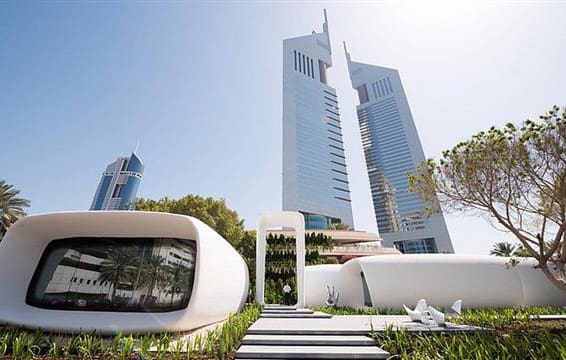Cazza, a US-based construction start-up, has announced plans to build the world’s first 3D-printed skyscraper in Dubai.
The announcement is the latest in a succession of firsts, as 3D printing seems to be gathering steam. The first 3D printed bridge, first 3D printed office and first 3D printed excavator, were all completed last year.
According to the firm the high rise will be created using a new technique, which it has dubbed “crane printing”. This technique will use cranes with printing units specifically designed to incorporate added units that are specifically designed for printing structures above 80m high.
Explaining the thinking behind printing upwards Chris Kelsey, CEO of Cazza, was reported in Construction Week Online as saying: “When we first thought of implementing 3D printing technologies, we were mostly thinking of houses and low-rise buildings.

Dubai’s 3D printed office
“Developers kept asking us if it was possible to build a 3D printed skyscraper. This led us to begin researching how we could adapt the technologies for taller structures.
“Through our technologies, we will be able to build architecturally complex buildings at never-before seen speeds. It is all about economies of scale where the initial high technology costs will reduce as we enter the mass-production phase,” he added.
According to the company its crane printing process will include all major structural components of the skyscraper, including reinforced steel and concrete. The rest of the building will be completed with a combination of 3D printed components and traditional methods.
The skyscraper, however, may not be happening in the near future because although Cazza has announced its plans, it has not yet disclosed any of the details of the project, including the building’s client, planned height, site, budget or any commencement or completion dates.
Top image: Dreamstime
Through our technologies, we will be able to build architecturally complex buildings at never-before-seen speeds. It is all about economies of scale where the initial high technology costs will reduce as we enter the mass-production phase.– Chris Kelsey, CEO, Cazza
Comments
Comments are closed.












Are all the materials environmentally friendly and sustainable